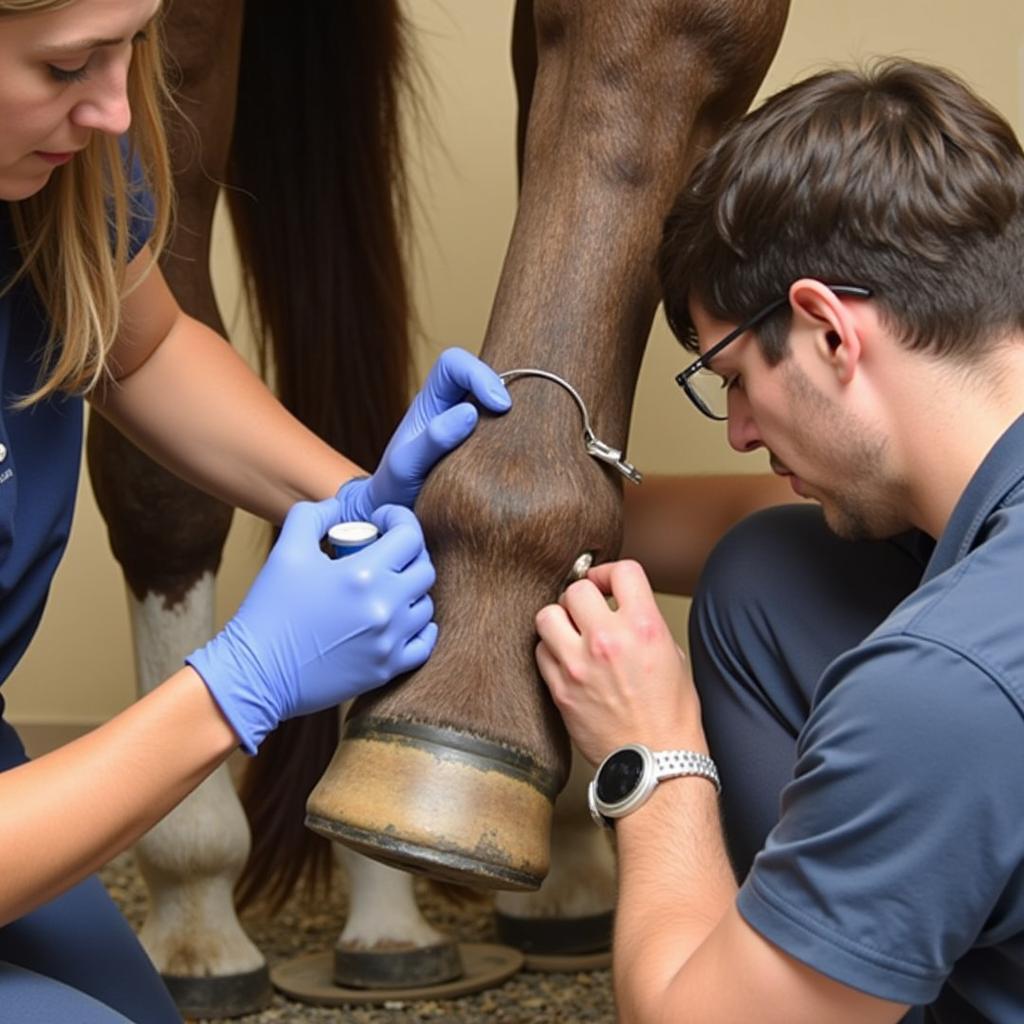Horse Hocks Fusing is a serious condition that can significantly impact a horse’s mobility and quality of life. It’s crucial for horse owners to understand the causes, symptoms, and treatment options for this debilitating issue. This article will delve into the complexities of hock fusion in horses, providing valuable insights to help you recognize and manage this condition.
What is Horse Hock Fusing?
Horse hock fusing, also known as ankylosis, refers to the abnormal joining of bones within the hock joint. This fusion can occur due to various factors, including arthritis, trauma, or infection. The hock joint, a complex structure in the horse’s hind leg, plays a crucial role in their movement. When the bones within this joint fuse, it restricts the horse’s range of motion and can cause significant pain and lameness. Understanding the underlying causes of horse hocks fusing is essential for effective prevention and treatment.
Causes of Hock Fusion in Horses
Several factors can contribute to horse hocks fusing. Osteoarthritis, a degenerative joint disease, is a common culprit. Trauma, such as fractures or dislocations, can also damage the joint cartilage and lead to fusion. Infections within the joint can also trigger an inflammatory response that eventually results in ankylosis. Certain developmental conditions can also predispose horses to hock fusion. Recognizing the signs of hock pain in horses is crucial for early intervention. For more information on recognizing these signs, you can visit our article on signs of hock pain in horses.
Osteoarthritis and its Role in Hock Fusion
Osteoarthritis is a leading cause of hock fusion in horses. The gradual wear and tear on the joint cartilage can trigger inflammation and bone spurs, ultimately leading to fusion. Managing osteoarthritis through proper nutrition, exercise, and medications can help slow the progression of the disease and reduce the risk of hock fusion.
Traumatic Injuries and Their Impact
Traumatic injuries to the hock, such as kicks or falls, can directly damage the joint and initiate the fusion process. Prompt veterinary care is vital in these cases to minimize the long-term effects.
Symptoms of Horse Hocks Fusing
The symptoms of hock fusion can vary depending on the severity of the condition. Horses may exhibit stiffness, lameness, and swelling in the affected hock. They may also have difficulty flexing the joint. You can find more information on hock pain symptoms in horses at our dedicated article: hock pain in horses symptoms. Early diagnosis is essential for effective management of horse hocks fusing.
Diagnosing Hock Fusion
Veterinarians use a combination of physical examination, imaging techniques (such as X-rays), and sometimes joint fluid analysis to diagnose hock fusion. Early diagnosis can greatly improve the prognosis.
Treatment Options for Fused Hocks
Treatment for horse hocks fusing focuses on managing pain and maintaining mobility. This can involve medications, such as anti-inflammatories and joint supplements. In some cases, surgery may be necessary to remove bone spurs or improve joint function. Alternative therapies, such as acupuncture and chiropractic care, may also provide relief.
 Horse Receiving Hock Treatment
Horse Receiving Hock Treatment
“Early and accurate diagnosis is crucial for managing hock fusion,” explains Dr. Emily Carter, DVM, specializing in equine orthopedics. “The sooner we can intervene, the better the chances of slowing the progression and improving the horse’s comfort.”
Managing Hock Fusion Long-Term
Long-term management of hock fusion involves a comprehensive approach that addresses pain management, joint support, and maintaining the horse’s overall well-being. Regular veterinary check-ups are crucial to monitor the condition and adjust the treatment plan as needed.
“Regular exercise and controlled activity can help maintain muscle strength and joint flexibility,” adds Dr. Sarah Miller, an equine rehabilitation specialist. “This is vital for maintaining the horse’s quality of life.”
Conclusion
Horse hocks fusing is a serious condition that requires diligent management. Understanding the causes, symptoms, and treatment options empowers horse owners to take proactive steps to protect their horses’ well-being. Early diagnosis and intervention are crucial for improving the prognosis and minimizing the long-term impact of this debilitating condition.
FAQ
- What is the most common cause of hock fusion in horses?
- Can hock fusion be prevented?
- What are the long-term effects of hock fusion?
- What is the typical recovery time after hock surgery?
- Are there alternative therapies that can help manage hock pain?
- What should I do if I suspect my horse has fused hocks?
- How can I support my horse’s overall health during hock fusion treatment?
Need help with your horse? Contact us! Phone: 0772127271, Email: [email protected] or visit us at QGM2+WX2, Vị Trung, Vị Thuỷ, Hậu Giang, Việt Nam. We have a 24/7 customer service team.